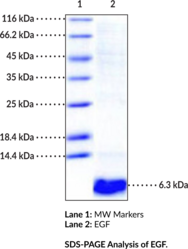Territorial Availability: Available through Bertin Technologies only in France
- Correlated keywords
- Trypanosoma Escherichia HOMG4 HOMG-4
- Product Overview:
Epidermal growth factor (EGF) is a polypeptide ligand for the EGF receptor (EGFR; Item No. 32026).{53764,53765} It is synthesized as a 1,217 amino acid glycosylated transmembrane precursor protein from which mature, soluble EGF is formed by proteolysis. Mature EGF is a 53-amino acid polypeptide that contains six cysteine residues, which form three intramolecular disulfide bonds essential to the biological activity of EGF. EGF is synthesized in the brain, kidney, pancreas, small intestine, pituitary gland, and submaxillary gland and is found in various bodily fluids, including saliva, cerebrospinal fluid, blood, breast milk, and prostatic fluid.{53765} Binding of EGF to the EGFR induces receptor dimerization, autophosphorylation, and intracellular signaling with roles in cell proliferation. In patients with early Parkinson’s disease and Alzheimer’s disease with amnestic mild cognitive impairment, low plasma EGF levels are predictive of future long-term cognitive decline.{53766} Plasma levels of EGF are reduced in pregnant woman infected with T. cruzi compared with uninfected pregnant controls.{53767} Exogenous application of EGF normalizes cortical GABAergic transmission and improves rotarod performance in the R6/2 transgenic mouse model of Huntington’s disease.{53768} Probiotic administration of E. coli engineered to secrete human EGF induces epithelial barrier restoration in a mouse model of intestinal ulcers.{53769} Immunization with human EGF induces an anti-EGF antibody response and increased survival in mice with EGFR-expressing tumors.{53770} Cayman’s EGF (human, recombinant) protein can be used for cell-based assay applications. This protein consists of 54 amino acids and has a calculated molecular mass of 6.3 kDa.
Cayman Chemical’s mission is to help make research possible by supplying scientists worldwide with the basic research tools necessary for advancing human and animal health. Our utmost commitment to healthcare researchers is to offer the highest quality products with an affordable pricing policy.
Our scientists are experts in the synthesis, purification, and characterization of biochemicals ranging from small drug-like heterocycles to complex biolipids, fatty acids, and many others. We are also highly skilled in all aspects of assay and antibody development, protein expression, crystallization, and structure determination.
Over the past thirty years, Cayman developed a deep knowledge base in lipid biochemistry, including research involving the arachidonic acid cascade, inositol phosphates, and cannabinoids. This knowledge enabled the production of reagents of exceptional quality for cancer, oxidative injury, epigenetics, neuroscience, inflammation, metabolism, and many additional lines of research.
Our organic and analytical chemists specialize in the rapid development of manufacturing processes and analytical methods to carry out clinical and commercial GMP-API production. Pre-clinical drug discovery efforts are currently underway in the areas of bone restoration and repair, muscular dystrophy, oncology, and inflammation. A separate group of Ph.D.-level scientists are dedicated to offering Hit-to-Lead Discovery and Profiling Services for epigenetic targets. Our knowledgeable chemists can be contracted to perform complete sample analysis for analytes measured by the majority of our assays. We also offer a wide range of analytical services using LC-MS/MS, HPLC, GC, and many other techniques.
Accreditations
ISO/IEC 17025:2005
ISO Guide 34:2009
Cayman is a leader in the field of emerging drugs of abuse, providing high-purity Schedule I-V Controlled Substances to federally-licensed laboratories and qualified academic research institutions for forensic analyses. We are certified by ACLASS Accreditation Services with dual accreditation to ISO/IEC 17025:2005 and ISO Guide 34:2009.





